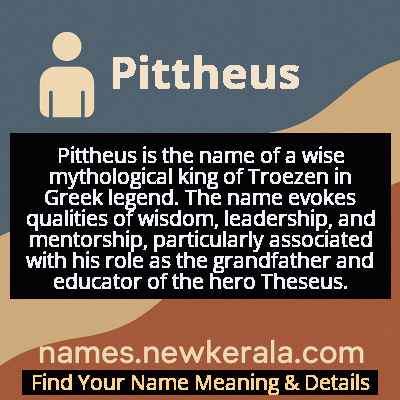Pittheus Name Meaning & Details
Origin, Popularity, Numerology Analysis & Name Meaning of Pittheus
Discover the origin, meaning, and cultural significance of the name PITTHEUS. Delve into its historical roots and explore the lasting impact it has had on communities and traditions.
Name
Pittheus
Gender
Male
Origin
Greek
Lucky Number
1
Meaning of the Name - Pittheus
Pittheus is the name of a wise mythological king of Troezen in Greek legend. The name evokes qualities of wisdom, leadership, and mentorship, particularly associated with his role as the grandfather and educator of the hero Theseus.
Pittheus - Complete Numerology Analysis
Your Numerology Number
Based on Pythagorean Numerology System
Ruling Planet
Sun
Positive Nature
Leaders, ambitious, highly driven, self-reliant, innovative.
Negative Traits
Overly aggressive, domineering, impatient, selfish.
Lucky Colours
Red, orange, gold.
Lucky Days
Sunday.
Lucky Stones
Ruby, garnet.
Harmony Numbers
2, 3, 9.
Best Suited Professions
Entrepreneurs, managers, engineers.
What People Like About You
Courage, determination, leadership.
Famous People Named Pittheus
Pittheus of Troezen
Mythological King
Founded Troezen and educated Theseus
Pittheus (Literary Figure)
Mythological Ruler
Symbol of wisdom in Greek literature
Pittheus (Historical Basis)
Ancient Leader
Possible historical king of early Troezen
Name Variations & International Equivalents
Click on blue names to explore their detailed meanings. Gray names with will be available soon.
Cultural & Historical Significance
In broader Greek mythology, Pittheus represents the ideal of the ruler who prioritizes wisdom over warfare, though he was also capable of military leadership when necessary. His ability to correctly interpret the Delphic Oracle's cryptic message about Aegeus' child demonstrates his intellectual prowess and connection to divine wisdom. The cultural legacy of Pittheus extends to philosophical discussions about ideal governance, where he serves as an early model of the philosopher-king concept that would later be developed by Plato and other Greek thinkers.
Extended Personality Analysis
The name Pittheus evokes personality traits centered around profound wisdom, careful judgment, and moral integrity. Individuals associated with this name typically demonstrate exceptional analytical abilities combined with practical insight, allowing them to navigate complex situations with remarkable clarity. They possess the patience to consider multiple perspectives before reaching conclusions, and their decisions are characterized by both intellectual rigor and ethical consideration. This thoughtful approach often makes them sought-after advisors and respected leaders who inspire trust through their consistency and depth of understanding.
Beyond their intellectual capacities, Pittheus personalities exhibit strong mentoring qualities and take genuine interest in guiding younger generations. They combine authority with approachability, creating environments where learning and growth can flourish. Their leadership style emphasizes collective wisdom rather than autocratic rule, though they can be decisive when circumstances demand immediate action. Emotionally, they tend to be stable and measured, with a deep sense of responsibility toward those in their care. The combination of these traits creates individuals who embody the ideal of the wise elder - respected for their knowledge, trusted for their judgment, and valued for their guidance.
Modern Usage & Popularity
In contemporary naming practices, Pittheus remains an exceptionally rare choice, primarily confined to academic circles and families with strong connections to classical Greek heritage. The name's complexity and strong mythological associations make it challenging for mainstream adoption, though it occasionally appears in Greece among families seeking to honor specific mythological or historical connections. Its usage is more common in literary and scholarly contexts than as a personal name, frequently appearing in translations of classical texts, historical analyses, and mythological studies. The name has never appeared on popular baby name lists in any country and is unlikely to gain widespread usage due to its specific cultural and linguistic requirements. However, it maintains a presence in specialized onomastic studies and continues to be referenced in works exploring Greek mythology and ancient naming traditions.
Symbolic & Spiritual Meanings
Symbolically, Pittheus represents the harmonious integration of intellectual wisdom with practical leadership. He embodies the archetype of the wise ruler who governs through knowledge and justice rather than force, serving as a mythological precursor to the philosopher-king ideal. The name carries connotations of prophetic insight and the ability to interpret divine messages for practical application, as demonstrated by his understanding of the Delphic Oracle's prophecy. Pittheus also symbolizes the importance of mentorship and education in shaping future generations, representing the transmission of wisdom and values from elders to the young. His symbolic significance extends to concepts of stable foundation-building and the establishment of lasting cultural institutions, reflecting his role as the founder and wise ruler of Troezen. In broader terms, the name represents the balance between contemplative wisdom and active governance, making it a powerful symbol of integrated leadership.

